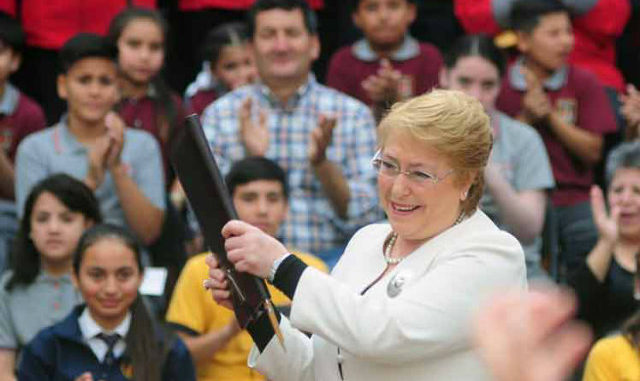
SANTIAGO – Chile now has a public education law that will transfer the administration of 6,500 schools and kindergartens to the government, based on the #NuevaEducaciónPública initiative of President Michelle Bachelet.
In a ceremony held at La Moneda Palace on Thursday, the president signed the new legislation that is part of the education reforms undertaken by her administration.
“It is time for public schools, kindergartens, and high schools to once again set the standard for quality education in Chile. It happened in the past, it happens in the leading countries (…),” she said.
Con la #NuevaEducaciónPública, avanzamos en garantizar el derecho de todos los niños, niñas y adolescentes de Chile a una educación de calidad independiente del lugar donde vivan, lo que siempre ha sido el corazón de nuestra reforma educacional. pic.twitter.com/FOos39M6RU
— Michelle Bachelet (@mbachelet) November 16, 2017
Bachelet argued that it is about leaving behind an educational system that recharged the municipalities of Chile with functions that are specific to society as a whole.
The so-called decentralization of education in municipalities, which ends the decree introduced by the dictatorship of Augusto Pinochet in 1981, includes the gradual creation until 2030 of 70 Local Public Education Services, with directors in their posts for six years.
They will be the ones who will be in charge of the educational establishments, instead of the municipalities, under the administration of the National Directorate of Public Education, which will assign resources and ensure their proper functioning.
Last month, as part of the 2018 government budget, Bachelet promised the Department of Education will receive over CLP10 billion (just over US$16 million), an increase of 5.9% from its 2017 budget.
Chile budget 2018: Bachelet promises 1 billion pesos for ‘free education’
Almost 10% of this will be dedicated to permitting the poorest 60% of students to study for free in universities and technical institutes.
The rise in spending on free education is an increase of 29.4% on this year’s budget, and will benefit some 360 000 students according to Dipres, the Chilean Budget Office.
Under the new budget, there will also be CLP480 million to increase the salaries of teachers in the municipal areas. During this past year, this sector has already seen increases of up to 30%, a figure which will continue to rise for the next fiscal year.



